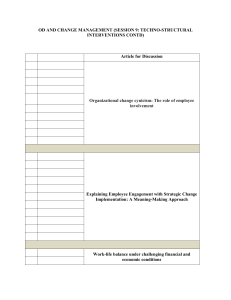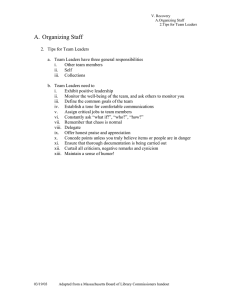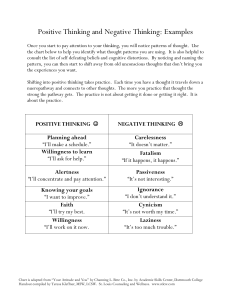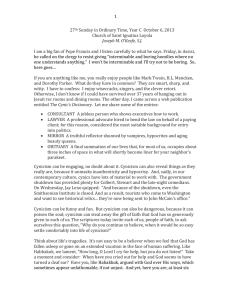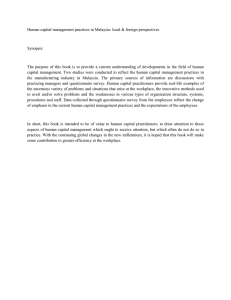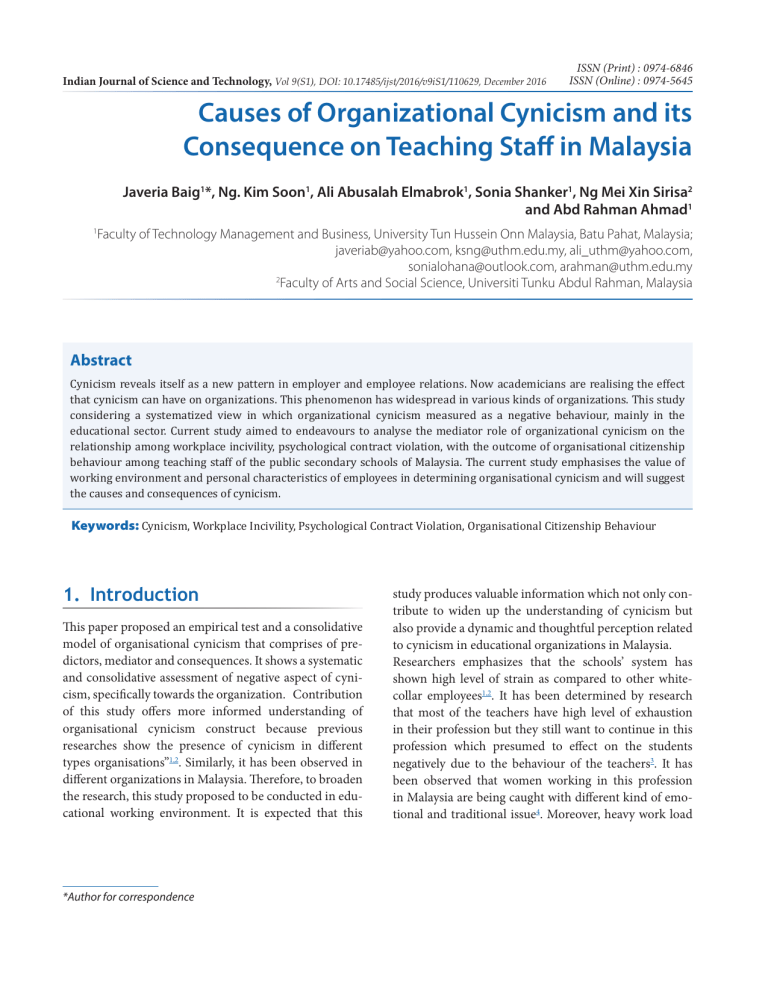
Indian Journal of Science and Technology, Vol 9(S1), DOI: 10.17485/ijst/2016/v9iS1/110629, December 2016 ISSN (Print) : 0974-6846 ISSN (Online) : 0974-5645 Causes of Organizational Cynicism and its Consequence on Teaching Staff in Malaysia Javeria Baig1*, Ng. Kim Soon1, Ali Abusalah Elmabrok1, Sonia Shanker1, Ng Mei Xin Sirisa2 and Abd Rahman Ahmad1 Faculty of Technology Management and Business, University Tun Hussein Onn Malaysia, Batu Pahat, Malaysia; javeriab@yahoo.com, ksng@uthm.edu.my, ali_uthm@yahoo.com, sonialohana@outlook.com, arahman@uthm.edu.my 2 Faculty of Arts and Social Science, Universiti Tunku Abdul Rahman, Malaysia 1 Abstract Cynicism reveals itself as a new pattern in employer and employee relations. Now academicians are realising the effect that cynicism can have on organizations. This phenomenon has widespread in various kinds of organizations. This study considering a systematized view in which organizational cynicism measured as a negative behaviour, mainly in the educational sector. Current study aimed to endeavours to analyse the mediator role of organizational cynicism on the relationship among workplace incivility, psychological contract violation, with the outcome of organisational citizenship behaviour among teaching staff of the public secondary schools of Malaysia. The current study emphasises the value of working environment and personal characteristics of employees in determining organisational cynicism and will suggest the causes and consequences of cynicism. Keywords: Cynicism, Workplace Incivility, Psychological Contract Violation, Organisational Citizenship Behaviour 1. Introduction This paper proposed an empirical test and a consolidative model of organisational cynicism that comprises of predictors, mediator and consequences. It shows a systematic and consolidative assessment of negative aspect of cynicism, specifically towards the organization. “Contribution of this study offers more informed understanding of organisational cynicism construct because previous researches show the presence of cynicism in different types organisations”1,2. Similarly, it has been observed in different organizations in Malaysia. Therefore, to broaden the research, this study proposed to be conducted in educational working environment. It is expected that this *Author for correspondence study produces valuable information which not only contribute to widen up the understanding of cynicism but also provide a dynamic and thoughtful perception related to cynicism in educational organizations in Malaysia. Researchers emphasizes that the schools’ system has shown high level of strain as compared to other whitecollar employees1,2. It has been determined by research that most of the teachers have high level of exhaustion in their profession but they still want to continue in this profession which presumed to effect on the students negatively due to the behaviour of the teachers3. It has been observed that women working in this profession in Malaysia are being caught with different kind of emotional and traditional issue4. Moreover, heavy work load Causes of Organizational Cynicism and its Consequence on Teaching Staff in Malaysia with long working hours in such a stressful environment of the job in nominal wages increase the brain strain. The profession usually becomes plagued by a high turnover rate, those employees who want to continue in this profession take days-off, later quit from job and some perform inefficaciously with their co-workers because of work-related stress”5,6. This study works on exploratory and descriptive types of research design because it explores the mediating effect of organizational cynicism between workplace incivility and psychological contract violation and Organizational Citizenship Behaviour. Public secondary school teachers from Johor state of Malaysia are targeted on the bases of random-effects modelling from the total population to collect the data to examine predictors and outcome of organizational cynicism. 2. Literature Review This study purposes to analyse the potential influence of mediator, Organizational cynicism on the relationship among the workplace incivility, perceived psychological contract violation and Organizational Citizenship Behaviour (OCB). “This study recognises the presence of cynicism in all types of organizations but it will only focus in educational setting to scrutinize the working environment in the schools of Johor Bahru, Malaysia. The study will highlight some important factors which later will contribute to expand cynicism research into a professional field that has rarely been explored by past researches in Malaysia8. There have not been ascertained studies of cynicism in educational organizations. The reasons for choosing school teachers to explore organizational cynicism are multifold. First, there are numerous past studies7–12. Empirically investigated the issues of cynical attitude in nursing staff but very rare literature can be found on high school teachers. Although teaching and research profession report to be as stressful as the nursing. Second, the school teachers in Malaysia are going through similar behavioural and attitudinal problem as nursing staff. Third, it has been observed after reviewing the literature, organizational cynicism has rarely been explored in public higher school teaching profession in Malaysia. Within the context of this study, social exchange theory supports this assumption. “Social exchange theory is relevant where people have expectation from one another and attract them for one’s own interest. Such egocentric 2 Vol 9 (S1) | December 2016 | www.indjst.org approach produces cynicism in organization among employees13. Past researches related teachers strain have not focused clearly on cynicism limit in schools”14, therefore, scrutinizing this topic has been considered for this study. In15 discussed that social mistreatment can take a variety of forms. Workplace incivility is less intensified as compare to other deviant behaviours, such as workplace violence16, workplace aggression17, workplace bullying and workplace harassment, despite of, it still has important impact. In this scenario, incivility is not only limited to verbal abuse but it can also be nonverbal” which has some disrespectful nonverbal behaviours include glaring, ignoring, or excluding colleagues18. Moreover, keep the phone bells loud or not turning off mobile phones during meetings, leaving a jammed printer, gossiping and snapping at co-workers are suggested examples of uncivil behaviours in organisations19. Incivility differs from other forms of workplace mistreatment as a challenge at workplace norms and low intensity. Incivility has been found to impact employees’ health and wellbeing20, reduce productivity levels21,22 and influence OCB. In previous research cynicism was viewed as substitute of depersonalization phase of burnout23 this study is relevant to organizational cynicism awareness in education. In1 found that negative attitude may negatively affect Organizational Citizenship Behaviour (OCB) among teacher, mistreatment of co-workers may also take place where work load stress is also there with a wide range of factors. Therefore, workplace incivility, perceived psychological contract violation consider as a predictor of organizational cynicism. This study undertakes almost all the possible future calls to extend the previous models on organizational cynicism. In24 has developed unified model of organisational cynicism and explored the predictors and outcomes of organizational cynicism and suggested that future study should examine organizational cynicism as a mediator and effect on OCB. 3. Methodology Research methodology including statistical procedure with description of survey instruments, data collection method and targeted population with their brief introduction to this research. With the validity and reliability of measurement scale, also present statistical analysis technique which used to elaborate all hypotheses. There are different schools has been taken for the targeted population. Each school has different population size, there Indian Journal of Science and Technology Javeria Baig, Ng. Kim Soon, Ali Abusalah Elmabrok, Sonia Shanker, Ng Mei Xin Sirisa and Abd Rahman Ahmad for according to the rato, the survey questionnaire will be distributed on random sampling of the teachers25,26. The size of teachers in each school is different from each other therefore random-effect modelling is considered more appropriate for this research. 4. Significance of Research and Discussions This research decided to focus on public high school teacher to explore the predictors and the outcome of organizational cynicism. There are 10 districts in the Johor state of Malaysia. Johor district has been selected for survey due to one of a large number of populated states and there are a number of public and private schools, but the current study aim to focus only public high schools. Previous studies observed the relationship among organizational characteristics, perception of organizational support and horizontal violence as predictors of organizational cynicism1,22,26, lack of studies found to explore the workplace incivility and PCV as predictors and OCB as an outcome of organizational cynicism. 5. Conclusion As a summary, it has been observed that high levels of professional strain, sadness and cynicism are reported in the teaching and research profession, where it rated almost twice as much as the stress felt in other professions. Even the scope of this study is broad enough that not only limited to teaching staff of Malaysia but its findings can be applicable for other countries as well. It has been concluded from literature that if employees will be fairly treated and their rights will be properly acknowledged and efforts will be valued by the organization then they will be less persuaded towards organizational cynicism. Therefore, the study is useful for managing this type of effects. The proposed model will definitely be beneficial for the teaching staff and the solution which will be provided can be utilised for the educational sector”. 6. Acknowledgements With the humble thanks to the University Tun Onn Hussein Malaysia (UTHM) for encouraging the current research, also all the assistance and guidance provided by Vol 9 (S1) | December 2016 | www.indjst.org proposed Professor to accomplish all the requirements of PhD. 7. References 1. Munir Y, Khalifah ZB, Tahira A, Khan H. Interactive effect of organizational cynicism on perception of organizational politics and citizenship behaviour. International Journal of Information Processing and Management. 2014; 5(1): 18–27. 2. Bransgrove E. A decade of teacher stress: The changing nature of the determinants of teacher stress, 1981 to 1991. The South Pacific Journal of Teacher Education. 1994; 22(1):39–52. 3. Hock RR. Professional burnout among public school teachers. Public Personnel Management. 1988; 17(2):167–89. 4. Abdullah K, Noor NM, Wok S. The perceptions of women’s roles and progress: A study of Malay women. Social Indicators Research. 2008; 89(3):439–55. 5. UNESCO and ITA. Status of Teachers in Pakistan; 2013. Lahore, Pakistan. 2015. 6. Khalid A. Occupational stress - What nobody tells you about teaching in Pakistan. DAWN; 2015. 7. Laschinger HK, Grau AL. The influence of personal dispositional factors and organizational resources on workplace violence, burnout and health outcomes in new graduate nurses: A cross-sectional study. International Journal of Nursing Studies. 2012; 49(3):282–91. 8. Munir Y, Ghafoor MM, Rasli AM. Exploring the relationship of horizontal violence, organizational cynicism and turnover intention in the context of social exchange theory. International Journal of Human Rights in Healthcare. 2016; 9(4):254–66. 9. Wilson MA, Goettemoeller DM, Bevan NA, McCord JM. Moral distress: Levels, coping and preferred interventions in critical care and transitional care nurses. Journal of Clinical Nursing. 2013; 22(9-10):1455–66. 10. Wojtowicz B, Hagen B, Smith VD. No place to turn: Nursing students’ experiences of moral distress in mental health settings. International Journal of Mental Health Nursing. 2014; 23(3):257–64. 11. Laschinger HK, Fida R. A time-lagged analysis of the effect of authentic leadership on workplace bullying, burnout and occupational turnover intentions. European Journal of Work and Organizational Psychology. 2014; 23(5):739–53. 12. Suzuki E, Tagaya A, Ota K, Nagasawa Y, Matsuura R, Sato C. Factors affecting turnover of Japanese novice nurses in university hospitals in early and later periods of employment. Journal of Nursing Management. 2010; 18(2):194–204. 13. Blau PM. Exchange and power in social life. Transaction Publishers; 1964. Indian Journal of Science and Technology 3 Causes of Organizational Cynicism and its Consequence on Teaching Staff in Malaysia 14. Dorman JP. Relationship between school and classroom environment and teacher burnout: A LISREL analysis. Social Psychology of Education. 2003; 6(2):107–27. 15. Leiter MP, Peck E, Gumuchian S. Workplace incivility and its implications for well-being. Mistreatment in Organizations. 2015; 13:107–35. 16. Jackson D, Clare J, Mannix J. Who would want to be a nurse? Violence in the workplace – a factor in recruitment and retention. Journal of Nursing Management. 2002; 10(1):13–20. 17. Glomb TM. Workplace anger and aggression: Informing conceptual models with data from specific encounters. Journal of Occupational Health Psychology. 2002; 7(1): 20–36. 18. Lim S, Cortina LM, Magley VJ. Personal and workgroup incivility: Impact on work and health outcomes. Journal of Applied Psychology. 2008; 93(1):95–107. 19. Johnson PR, Indvik J. Slings and arrows of rudeness: Incivility in the workplace. Journal of Management Development, 2001; 20(8):705–14. 20. Lim S, Lee A. Work and nonwork outcomes of workplace incivility: Does family support help? Journal of Occupational Health Psychology. 2011; 16(1):95–111. 21. Ghosh R, Jacobs JL, Reio TG. The toxic continuum from incivility to violence: What can HRD do? Advances in Developing Human Resources. 2011; 13(1):3–9. 4 Vol 9 (S1) | December 2016 | www.indjst.org 22. Giumetti GW, Hatfield AL, Scisco JL, Schroeder AN, Muth ER, Kowalski RM. What a rude e-mail! Examining the differential effects of incivility versus support on mood, energy, engagement and performance in an online context. Journal of Occupational Health Psychology. 2013; 18(3):297–309. 23. Abraham R. Organizational cynicism: Bases and consequences. Genetic, Social and General Psychology Monographs. 2000; 126(3):269–92. 24. Chiaburu DS, Peng AC, Oh IS, Banks GC, Lomeli LC. Antecedents and consequences of employee organizational cynicism: A meta-analysis. Journal of Vocational Behavior. 2013; 83(2):181–97. 25. Hunter JE, Schmidt FL. Fixed effects vs. random effects meta-analysis models: Implications for cumulative research knowledge. International Journal of Selection and Assessment. 2000; 8(4):275–92. 26. Cheung MW. A model for integrating fixed-, random- and mixed-effects meta-analyses into structural equation modelling. Psychological Methods. 2008; 13(3):182–202. 27. Andersson LM. Employee cynicism: An examination using a contract violation framework. Human Relations. 1996; 49(11):1395–418. Indian Journal of Science and Technology
